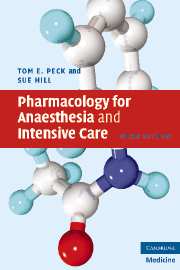Book contents
- Frontmatter
- Contents
- Contributor
- Preface
- Foreword
- SECTION I Basic principles
- SECTION II Core drugs in anaesthetic practice
- SECTION III Cardiovascular drugs
- SECTION IV Other important drugs
- 17 Central nervous system
- 18 Antiemetics and related drugs
- 19 Drugs acting on the gut
- 20 Intravenous fluids
- 21 Diuretics
- 22 Antimicrobials
- 23 Drugs affecting coagulation
- 24 Drugs used in Diabetes
- 25 Corticosteroids and other hormone preparations
- Index
25 - Corticosteroids and other hormone preparations
Published online by Cambridge University Press: 01 June 2010
- Frontmatter
- Contents
- Contributor
- Preface
- Foreword
- SECTION I Basic principles
- SECTION II Core drugs in anaesthetic practice
- SECTION III Cardiovascular drugs
- SECTION IV Other important drugs
- 17 Central nervous system
- 18 Antiemetics and related drugs
- 19 Drugs acting on the gut
- 20 Intravenous fluids
- 21 Diuretics
- 22 Antimicrobials
- 23 Drugs affecting coagulation
- 24 Drugs used in Diabetes
- 25 Corticosteroids and other hormone preparations
- Index
Summary
Glucocorticoids
The adrenal cortex releases two classes of steroidal hormones into the circulation:
Glucocorticoids (from the zona fasciculata and zona reticularis)
Mineralocorticoids (from the zona glomerulosa)
The main endogenous glucocorticoid in humans is hydrocortisone. Synthetic glucocorticoids include prednisolone, methylprednisolone, betamethasone, dexamethasone and triamcinolone. They have metabolic, anti-inflammatory and immunosuppressive effects.
Metabolic effects
Glucocorticoids facilitate gluconeogenesis (i.e. synthesis of glucose from a non-carbohydrate source, e.g. protein). Glycogen deposition and glucose release from the liver are stimulated but the peripheral uptake of glucose is inhibited. Protein catabolism is stimulated and synthesis inhibited.
When exogenous glucocorticoid is given in high doses or for prolonged periods, the altered metabolism causes unwanted effects. Increased protein catabolism leads to muscle weakness and wasting. The skin becomes thin leading to striae, and gastric mucosa becomes susceptible to ulceration. Dietary protein will not reverse these changes. Altered carbohydrate metabolism leads to hyperglycaemia and glycosuria. Diabetes may be provoked. Fat is redistributed from the extremities to the trunk, neck and face. Bone catabolism leads to osteoporosis.
Anti-inflammatory effects
Glucocorticoids reduce the production of tissue transudate and cell oedema in acute inflammation. Circulating polymorphs and macrophages are prevented from reaching inflamed tissue. The production of inflammatory mediators (prostaglandins, leukotrienes and platelet-activating factor) is suppressed by the stimulation of lipocortin, which inhibits phospholipase A2. Normally phospholipase A2 would facilitate the breakdown of membrane phospholipids to arachidonic acid, the precursor of inflammatory mediators, in particular prostaglandins.
- Type
- Chapter
- Information
- Pharmacology for Anaesthesia and Intensive Care , pp. 353 - 359Publisher: Cambridge University PressPrint publication year: 2008



